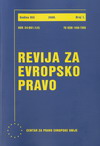HOW CAN PROTECTION OF HUMAN RIGHTS BE PREVENTED FROM BEING ABUSED?
HOW CAN PROTECTION OF HUMAN RIGHTS BE PREVENTED FROM BEING ABUSED?
Author(s): Momir MilojevićSubject(s): Law, Constitution, Jurisprudence, International Law, Human Rights and Humanitarian Law
Published by: Удружење за европско право - Центар за право Европске уније
Keywords: human rights; abuse; good faith; equity; prevention of abuses; preventive measures; punitive measures
Summary/Abstract: Increasingly, the expansion of human rights protection can serve to cover up anti-social behavior rather than its purpose. The letter of the law remains intact but its purpose and spirit are perverted. Strict enforcement of rights results in disproportionate profit on the one hand and damage on the other. In any case, the purpose of the law is not achieved. The matter is not in the will of the legislator, but in the behavior of the individual who abuses the powers that the law gives him. This makes it easier to solve the problem because only the abuse of subjective rights is possible. Hence, this general legal problem occurs most often in the area of human rights and freedoms. Without going into whether this question is well-posed or not, it is clear that it is the result of a more recent development of the law into which it has been shyly introduced by jurisprudence in the field of private law. That is why the concept of abuse of rights was equated with an illegal act, and its prohibition was derived from the principles of public order, conscientiousness or fairness. Legislation and practice of states approach this problem differently, while the doctrine tries to establish at least some guiding principles, starting with the very concept of abuse of rights. Abuse of rights is represented by any act that, by its motives or consequences, is contrary to the spirit of law. Therefore, the violation or violation of rights and the abuse of rights must not be equated. In the first case, the illegality is obvious and is automatically followed by prescribed sanctions, while in the second case there is an appearance of perfect legality. The difference is theoretically clear if one takes into account that the objective right can be violated, and the subjective right can be abused. Therefore, it is easy to understand that the abuse of rights can be prohibited by objective law, as all subjective rights are granted, this applies to both domestic and international law. Violation of the norm prohibiting the abuse of rights is a violation of an objective right. In this way, violation and abuse of rights come closer to each other to the extent that objective and subjective law come closer. The practical consequences and the reaction of society can be the same, but they must be different because they are different categories. The abuse of rights occurs due to the incompleteness of objective law, that is, the legal order in which the prohibition of anti-social behavior is missing. That's why a specific action of an individual can be formally in accordance with the law but fundamentally against its spirit. Therefore, subjective rights must be kept within the limits that will be sufficient for the exercise of individual rights and freedoms without harming the interests of society. Abuse of rights is possible when the law leaves the individual with wide possibilities for action. Therefore, it originated in private law, but over time it occupied a good part of public law. Abuse of rights is related to the exercise of subjective rights, but this does not mean that all subjective rights can be abused. Some of the most important individual rights cannot be abused (e.g. rights to life, human treatment, security, non-discrimination. Rights and freedoms can be abused, the exercise of which produces consequences for other persons or for society (freedom of expression, peaceful assembly, association, religion, private and family life, correspondence, many property, economic and social rights, freedom of movement, rights in criminal and civil proceedings, etc.) The European Convention on Human Rights contains many restrictions regarding the enjoyment of certain rights and freedoms, but abuse is outside them , in the exercise of what is permitted. The European Convention mentions abuse only when it stipulates that petitions that represent an obvious abuse of the right to petition will be rejected. In practice, the term was not explained because petitions were rejected for other reasons, which was criticized in doctrine. The multitude of rights and freedoms that can be abused, as well as the different conditions in individual countries, make it impossible to create a general picture of the causes and forms in which abuses can occur. This requires a special study of sociological, economic and other circumstances that influence the occurrence of rights abuses in each environment or region, but using the same methodology in order to draw general conclusions. Based on those conclusions, appropriate measures can be taken to prevent abuses or eliminate their consequences. These measures are usually divided into preventive (legislation, education) and coercive measures. This is the task of both experts and politicians.
Journal: Revija za evropsko pravo
- Issue Year: 6/2004
- Issue No: 1
- Page Range: 7-25
- Page Count: 19
- Language: English

